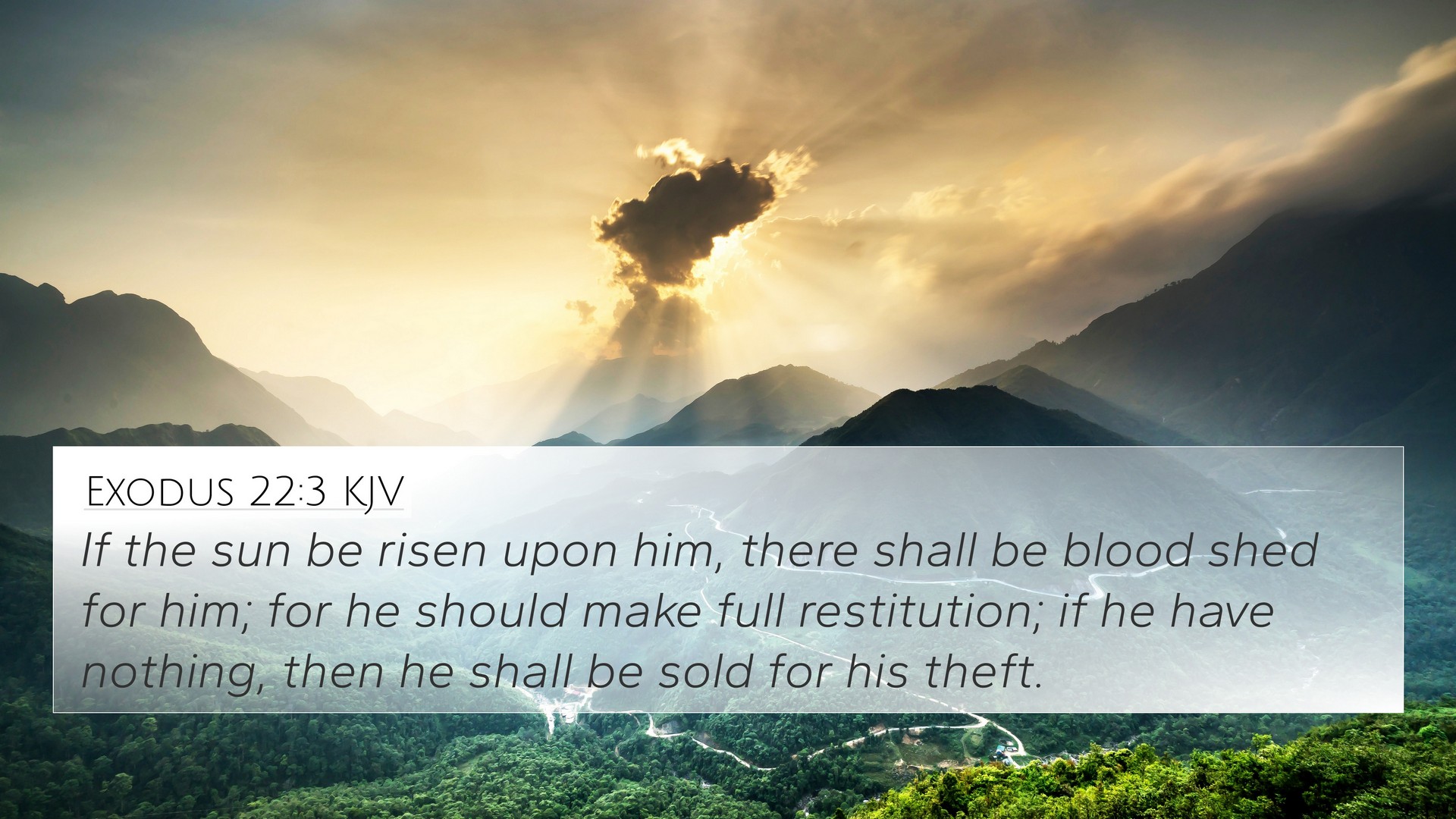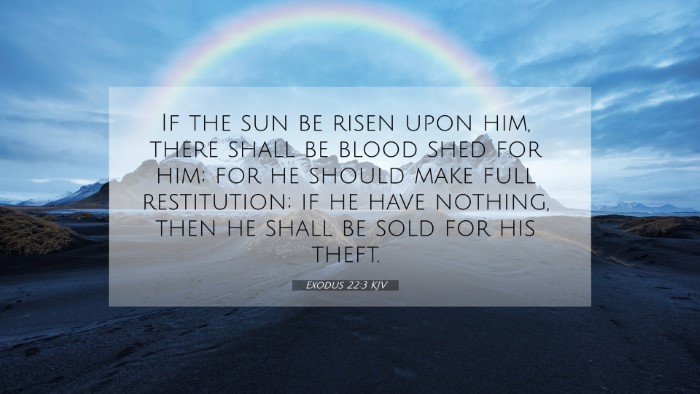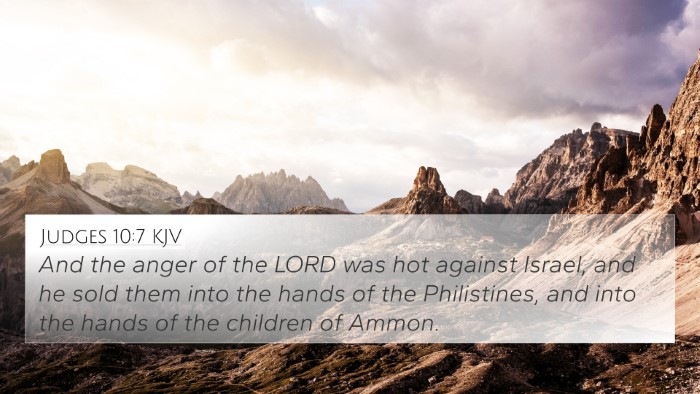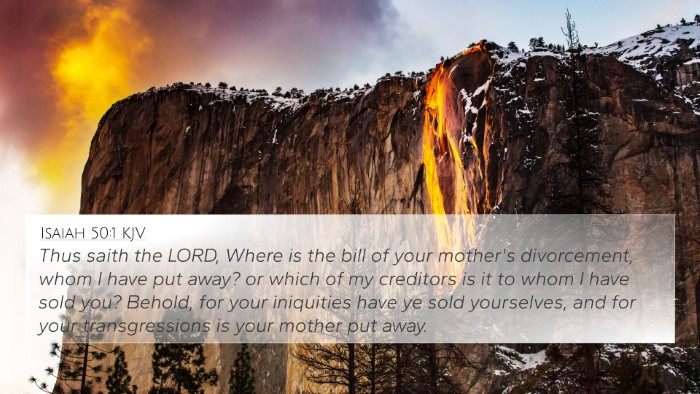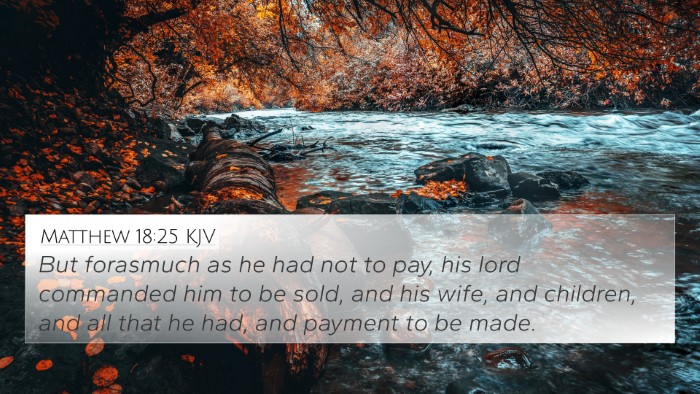Meaning of Exodus 22:3
Exodus 22:3 states, "If the sun has risen on him, there shall be blood guilt for him." This verse addresses the serious matter of theft and the consequences that follow. The Biblical context here outlines the principles of justice and accountability in society, particularly in regard to offenses that disrupt communal harmony.
Summary of Commentaries
This verse has been interpreted through various lenses by noted Biblical commentaries, providing depth and understanding to its meaning.
-
Matthew Henry:
Henry emphasizes the moral implications of the law and the necessity for restitution. He notes that the mention of the sun rising signifies the importance of timely action and resolution in matters of theft. The verse highlights the greater responsibility resting on those who are guilty, particularly when their actions lead to loss that can be traced directly back to them.
-
Albert Barnes:
Barnes provides a detailed exposition on how this law serves as a protective measure for property rights and community peace. He illustrates how the phrase "blood guilt" indicates the severity of violating one's property rights, suggesting that theft leads to a larger societal deterioration, drawing attention to the need for communal accountability.
-
Adam Clarke:
Clarke expands on the legal ramifications of this law, reflecting on its application in a judicial context. He explains that the stipulation regarding daylight serves to underscore the awareness of one's actions and the lack of excuse for wrongdoing. Clarke also connects this precept to the larger theme of personal responsibility and moral integrity in society.
Connections Between Bible Verses
Exodus 22:3 can be cross-referenced with several other verses that relate to theft, justice, and retribution, forming a scriptural dialogue that enriches the understanding of social ethics in the Bible:
- Leviticus 6:2-5: Details the guilt offering procedures for theft and the necessity of restitution.
- Proverbs 6:30-31: Discusses the consequences and moral implications of stealing, emphasizing the need to restore what was taken.
- Zechariah 5:3-4: Addresses the consequences of theft and dishonest acts, emphasizing the curse on those who steal.
- If anyone is found stealing from another, he must pay back double:(Exodus 22:7)
- Deuteronomy 24:7: Warns against kidnapping and its severe consequences, underscoring the gravity of stealing lives and property.
- John 10:10: Jesus speaks of the thief who comes to steal, kill, and destroy, contrasting His purpose of giving life abundantly.
- Romans 13:10: Explains that love does no harm to a neighbor, relating to the broader theme of community ethics.
- Matthew 5:38-39: Jesus teaches about not retaliating against evil, providing a different yet related perspective on justice.
- 1 Corinthians 6:10: Warns that thieves will not inherit the kingdom, stressing the eternal implications of secular justice.
Thematic Bible Verse Connections
This scripture serves as a vital reference point within the broader narrative of the Bible regarding ethics and communal living. The importance of restitution, accountability, and moral integrity are prevalent themes throughout the scriptures.
Tools for Biblical Cross-Referencing
To delve deeper into the connections and meanings of Exodus 22:3, one may consider using tools such as:
- Bible Concordance: A helpful resource for locating specific scriptures and their references.
- Bible Cross-Reference Guide: This provides a systematic approach to finding related verses across the Bible.
- Cross-Referencing Bible Study: Methods that aid in understanding the connectedness of scripture for more profound insights.
- Bible Chain References: Utilizing thematic chains that connect verses with similar themes or messages.
- Comprehensive Bible Cross-Reference Materials: Tools and books that compile extensive references for easy study and reference.
Conclusion
In summary, Exodus 22:3 encapsulates a critical principle of justice within the community defined by the consequences of wrongdoing, emphasizing the need for restitution. By cross-referencing this verse with others through structured Bible study tools, one can unearth deeper meanings and broaden the understanding of Biblical laws surrounding theft and ethics.
Engaging in comparative Bible verse analysis and understanding the inter-Biblical dialogue surrounding these themes allows believers to gain not just theoretical knowledge but practical guidance for a moral and just existence.
